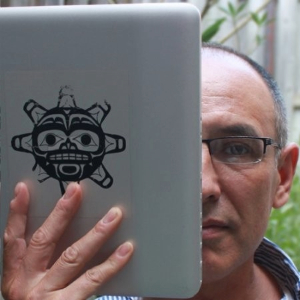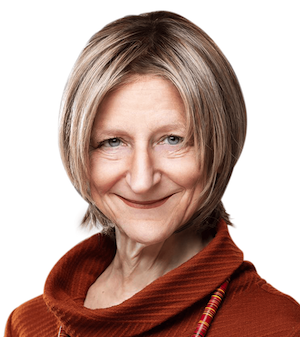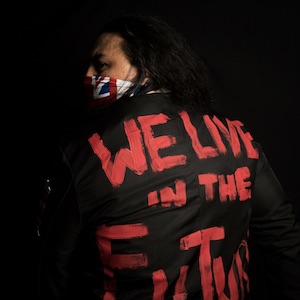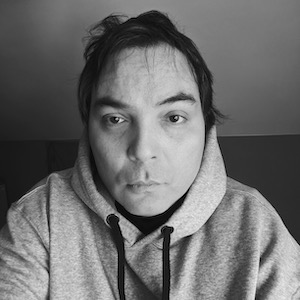Abundant Intelligences Integration Series: Epistemological Foundations Conversation 05
Research Creation and AI
The Epistemological Foundations Conversations feature members of the Abundant Intelligences research team sharing how the knowledge frameworks in their field are constructed, validated, and employed. Our fifth conversation featured Archer Pechawis, Scott Benesiinabandan, and Bryan Kamaoli Kuwada, with moderation by Sara Diamond and hosting by Ceyda Yolgörmez.
This conversation addressed the intersection of Research-Creation and AI through Indigenous Knowledges. In the last 20 years, research-creation methodologies have emerged and been increasingly recognized within the academic research community. That being said, Indigenous Knowledge Systems have drawn on research-creation for millennia – and many artists from diverse cultures have long engaged in research as well as creation.
Academic interest into research-creation has opened the door to deeper and wider forms of knowledge exploration and sharing. This has meant the institutionalization and expansion of research-creation PhDs and grants in the UK, Australia, Canada, and some other territories. In some instances, this was not necessarily out of a genuine commitment to these practices but to help institutions achieve their research funding allocation. With such contradictions in the background, our discussion started out by defining what research-creation is for our panelists and moved on to explore the ways that they use research-creation to engage with AI.
Epistemological Foundations Conversation Series
This only shows up because there is something written in the Epistemological Foundations Conversation Series’ category’s description.
Event
Impact
Co-investigator Feature
Conference / panel
Student Exchange
Speakers:
Archer Pechawis
Sara Diamond
Bryan Kamaoli Kuwada
Ceyda Yolgörmez
Scott Benesiinaabandan
Date:
2024-09-18
Location:
Canada
Featured People

Archer Pechawis
Performance artist, new media artist, filmmaker, writer, curator and educator Archer Pechawis was born in Alert Bay, BC in 1963. He has been a practicing artist since 1984 with particular interest in the intersection of Plains Cree culture and digital technology, merging “traditional” objects such as hand drums with digital video and audio sampling. His work has been exhibited across Canada and in Paris France, and featured in publications such as Fuse Magazine and Canadian Theatre Review. Archer has been the recipient of many Canada Council, British Columbia and Ontario Arts Council awards, and won the Best New Media Award at the 2007 imagineNATIVE Film + Media Arts Festival and Best Experimental Short at imagineNATIVE in 2009.
Archer works extensively with Native youth as part of his art practice, teaching performance and digital media for various organizations and in the public school system. Of Cree and European ancestry, he is a member of Mistawasis First Nation, Saskatchewan.
Archer Pechawis (Cree) is a multimedia performance artist who integrates computational methods into traditional Indigenous performance. A York U Asst. Prof, he has been a long-time advocate for building capacity in digital technology with Indigenous youth. He will contribute to the theoretical and practical development of Indigenous epistemologies within computational contexts.

Sara Diamond
Dr. Sara Diamond, President Emerita of OCAD University has led institutional transformation within arts, digital media/ICT, and post-secondary institutions for over 30 years. Diamond was President and Vice-Chancellor of OCAD University from 2005-2020, leading its transformation to full university status. She was founding director of the Banff New Media Institute (1995 — 2005). As a historian, media artist and computer scientist, Diamond brings a deep interest in the relationships of human practices, culture, and technologies and a profound commitment to equity and Indigenous rights. She has been co-PI on major research networks such as Am-I-Able (wearable technologies and IoT) and the Centre for Information Visualization and Data Driven Design. She has undertaken NSERC, SSHRC, Ontario Research Excellent Fund, Mitacs, and foundation funded research in data analytics and visualization, urban and transportation planning, public art, cultural analytics, and wearable technology to support seniors’ wellbeing. Current funded scholarship includes acting as co-PI for the iCity2.0 project (ORF-E), applying AI tools such as generative design to complete community planning (ORF-E, Mitacs); developing a Machine Learning qualitative analytics framework to understand the impact of screen media on audiences (Mitacs); creating mobile affective computing solutions to support mood analysis and mental health in the workplace (Mitacs); reassessing archives through visualization and metadata analysis (SSHRC), and ongoing considerations of human, animal and machine agency. True to her early training as a social historian she continues to write about the history of media arts and technologies.
Recognitions include the Order of Canada, Order of Ontario, Doctor of Science, honoris causa, Simon Fraser University, 2020; the 2020 Exceptional Women of Excellence from the Women’s Economic Forum and two New Media “Pioneer” awards. She is a Senior Fellow at the University of Toronto’s Massey College and Adjunct Professor at University College Dublin and UCLA. Diamond acted as a reviewer for the 2021 mid-term CFREF assessments and for the NFREF competition.
She is co-chair of Toronto’s ArtworxTO, the Year of Public Art and Toronto’s Nuit Blanche; is the chair for the Toronto Arts Foundation and of the new Baycrest Academy for Research and Education. Diamond is an Expert Panelist with the Canadian Centre for the Purpose of the Corporation and a Thought Leader with Lord Cultural Resources.
(OC OO RCSA), President Emerita OCAD University, has led collaborative efforts to strengthen equity and diversity and to support Indigenous cultures, research, and decolonization in the academy. She contributes expertise in data visualization and wearable technology, research-creation methodologies, and integration of Indigenous research methodologies into academic contexts.

Bryan Kamaoli Kuwada
Bryan Kamaoli Kuwada (Kanaka Maoli) is Asst. Prof. at UH’s Kamakakūokalani Center for Hawaiian Studies, specializing in Hawaiian language translation and storytelling practices. He is an editor and author who explores Indigenous Futurism through fiction, poetry, photography, essays and scholarly publications. He wrote “We Live in the Future. Come Join Us.”, a seminal meditation on how Hawaiian ancestral practices enable abundant futures. Much of his research is focused on the nineteenth-century Hawaiian-language newspapers, a massive archive of Indigenous-authored writing that encompasses daily events to shipping notices to meditations on sovereignty to stories both traditional and contemporary. His work also focuses on Hawaiian and Indigenous digital media as a researcher, creator, and teacher of it. In 2017 and 2018, he helped put on intensive three-week workshops on telling traditional mo’olelo (stories/accounts/histories) through video games, through a strong partnership between Kanaeokana, a network of Native Hawaiian schools and organizations, AbTec, and the Initiative for Indigenous Futures. He also teaches courses on digital media and Hawaiian/Indigenous Futurisms.
Bryan Kamoli Kuwada will contribute expertise on how Hawaiian ancestral practices enable abundant futures, as exemplified in his seminal “We Live in the Future. Come Join Us.” essay.

Ceyda Yolgörmez
Ceyda Yolgormez is a Postdoc at the Indigenous Futures Research Cluster, working in the Abundant Intelligences Research Program. Her PhD work brought together social theory and interactive technologies, such as large machine learning models or social robots, to consider how our conceptions of the social are changing. Her PhD dissertation proposes a framework for a sociology of machines that reimagines human-machine relations. Her research looks at playful and creative engagements with machines as a site to explore and experiment with human machine socialities, and is interested in methodologies that reveal and trouble the common-sensical way in which we understand such relations.

Scott Benesiinaabandan
Scott Benesiinaabandan is an Anishinaabe from Obishkkokaang. Scott is an intermedia artist that currently works in experimental image making and sonic materials. Scott is currently resident in Montreal, where he has completed a MFA in photography. Scott’s current research interests are intersections of artificial-intelligence and Anishinaabemowin, Scott has completed international residencies at Parramatta Artist Studios in Australia, Context Gallery in Derry, North of Ireland, and University Lethbridge/Royal Institute of Technology iAIR residency, along with international collaborative projects in both the U.K and Ireland. Scott has completed residencies with Initiative for Indigenous Futures and AbTec in Montreal.
Benesiinaabandan has been awarded grants from the Canada Council for the Arts, Manitoba Arts Council, Winnipeg Arts Council and Conseil des arts des lettre du Quebec. His work can be found in a number of private, provincial and national collections.
Benesiinaabandan has taken part in several notable exhibitions across Canada and internationally, Harbourfront’s Flatter the Land/Bigger the Ruckus, ,Subconscious City at the Winnipeg Art Gallery, GHOSTDANCE at Ryerson Image Centre and solo exhibitions; unSacred, at Gallery 1C03 and in Sydney,Australia, mii omaa ayaad/Oshiki Inendemowin , Melbourne with Blood Memories, little resistances at Platform Gallery, Insurgence/Resurgence (2017) and recently completed a public commission for CONTACT Photography Festival in Toronto.
